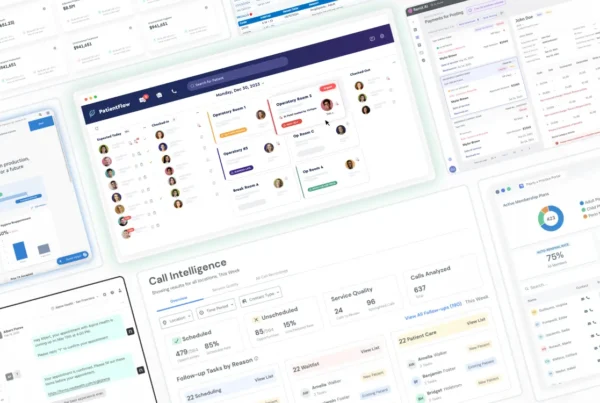
In 2024, the micro SaaS landscape continues to evolve, driven by emerging market demands and technological advancements. To help entrepreneurs and developers identify lucrative opportunities, this blog explores ten micro SaaS ideas tailored to different niches, each addressing specific challenges within its respective industry.
1. Healthcare Compliance Management
In the healthcare sector, staying compliant with regulations like HIPAA is critical. A microSaaS focused on healthcare compliance management can automate document tracking, provide real-time compliance checks, and offer AI-driven recommendations to ensure healthcare providers meet all regulatory requirements.
Why it works: Compliance in healthcare is complex and time-consuming. Automating this process with a specialized tool reduces the burden on healthcare professionals and minimizes the risk of non-compliance.
2. Legal Document Automation
For law firms, managing and drafting documents is a significant part of daily operations. A micro SaaS offering AI-driven legal document automation can help law firms generate, review, and manage contracts and legal documents efficiently, reducing time and errors.
Why it works: Legal professionals need precise and reliable tools to manage documents. Automating this process with AI reduces the risk of human error and speeds up the workflow.
3. Restaurant Inventory Management
In the food service industry, managing inventory is a constant challenge. A micro SaaS that offers real-time inventory tracking, automated ordering, and waste reduction analytics can help restaurants manage their stock more efficiently, reducing costs and waste.
Why it works: With tight margins in the restaurant industry, efficient inventory management is crucial. This tool can help restaurants optimize their supply chain and reduce food waste.
4. E-commerce Localization Tools
E-commerce businesses are increasingly targeting global markets. A micro SaaS that offers AI-driven localization tools, including language translation, currency conversion, and region-specific marketing strategies, can help e-commerce platforms tailor their offerings to local audiences.
Why it works: As e-commerce continues to grow globally, businesses need to adapt to local markets. This tool simplifies the localization process, making it easier for businesses to enter new markets.
5. Fitness and Wellness Program Management
The fitness industry is booming, and wellness professionals need tools to manage their programs effectively. A micro SaaS that offers scheduling, client tracking, and personalized program creation can help fitness trainers and wellness coaches manage their clients and grow their businesses.
Why it works: Fitness professionals often struggle with administrative tasks. This tool can streamline these processes, allowing them to focus on client engagement and program development.
6. Real Estate Lead Generation and CRM
Real estate agents rely heavily on lead generation and customer relationship management (CRM) tools. A micro SaaS that offers AI-driven lead scoring, property matching, and client relationship management tailored to the real estate industry can help agents close more deals.
Why it works: The real estate market is competitive, and agents need tools that help them manage leads and clients efficiently. A specialized CRM can provide the features they need to succeed.
7. Nonprofit Fundraising Management
Nonprofits face unique challenges in managing fundraising campaigns. A micro SaaS that offers donation tracking, campaign analytics, and donor engagement tools tailored for nonprofits can help organizations maximize their fundraising efforts.
Why it works: Nonprofits need specialized tools to manage donations and engage donors effectively. This micro SaaS can help them optimize their fundraising strategies.
8. Creative Agency Project Management
Creative agencies often juggle multiple projects with tight deadlines. A micro SaaS focused on project management for creative agencies can offer features like task management, client collaboration, and time tracking, tailored to the needs of creative teams.
Why it works: Creative professionals need tools that help them manage projects efficiently while allowing for creative flexibility. This tool can streamline project workflows and improve client satisfaction.
9. Agriculture Supply Chain Optimization
The agriculture industry is increasingly adopting technology to optimize operations. A micro SaaS that offers supply chain management tools, including crop tracking, yield prediction, and logistics optimization, can help farmers and agribusinesses improve efficiency.
Why it works: Agriculture is a complex industry with many moving parts. A specialized tool can help streamline operations and improve profitability.
10. Hospitality Guest Experience Enhancement
In the hospitality industry, guest experience is paramount. A micro SaaS that offers personalized guest experience management, including AI-driven recommendations, automated check-ins, and real-time feedback collection, can help hotels and resorts enhance their services.
Why it works: In a competitive industry like hospitality, delivering a personalized guest experience is key to success. This tool can help businesses stand out by offering tailored services that delight guests.
Market Trends for Micro SaaS Development in 2024 vs. 2023
In 2024, several trends distinguish the micro SaaS market from 2023:
- Greater AI Adoption: AI’s role has expanded, making it integral to SaaS development. Businesses are increasingly seeking AI-powered solutions to stay competitive.
- Niche Focus: There is a stronger emphasis on niche markets in 2024, as businesses look for specialized solutions tailored to their specific needs.
- Increased Remote Work Tools: The continued prevalence of remote work drives demand for AI-enhanced collaboration tools.
- Security and Compliance: With growing cyber threats and regulatory changes, micro SaaS solutions that focus on AI-driven security and compliance are in high demand.
AI’s Impact on SaaS in 2024
The integration of AI into SaaS has profound effects:
- Scalability and Efficiency: AI automates routine tasks, allowing micro SaaS businesses to scale without significantly increasing costs.
- Personalization: AI-driven insights enable SaaS products to offer personalized experiences, leading to higher user satisfaction and retention.
- Predictive Analytics: AI enhances decision-making by providing predictive insights, helping businesses anticipate trends and adjust strategies accordingly.
- Market Differentiation: AI can be a key differentiator for micro SaaS products, offering features that are more advanced than non-AI competitors.








